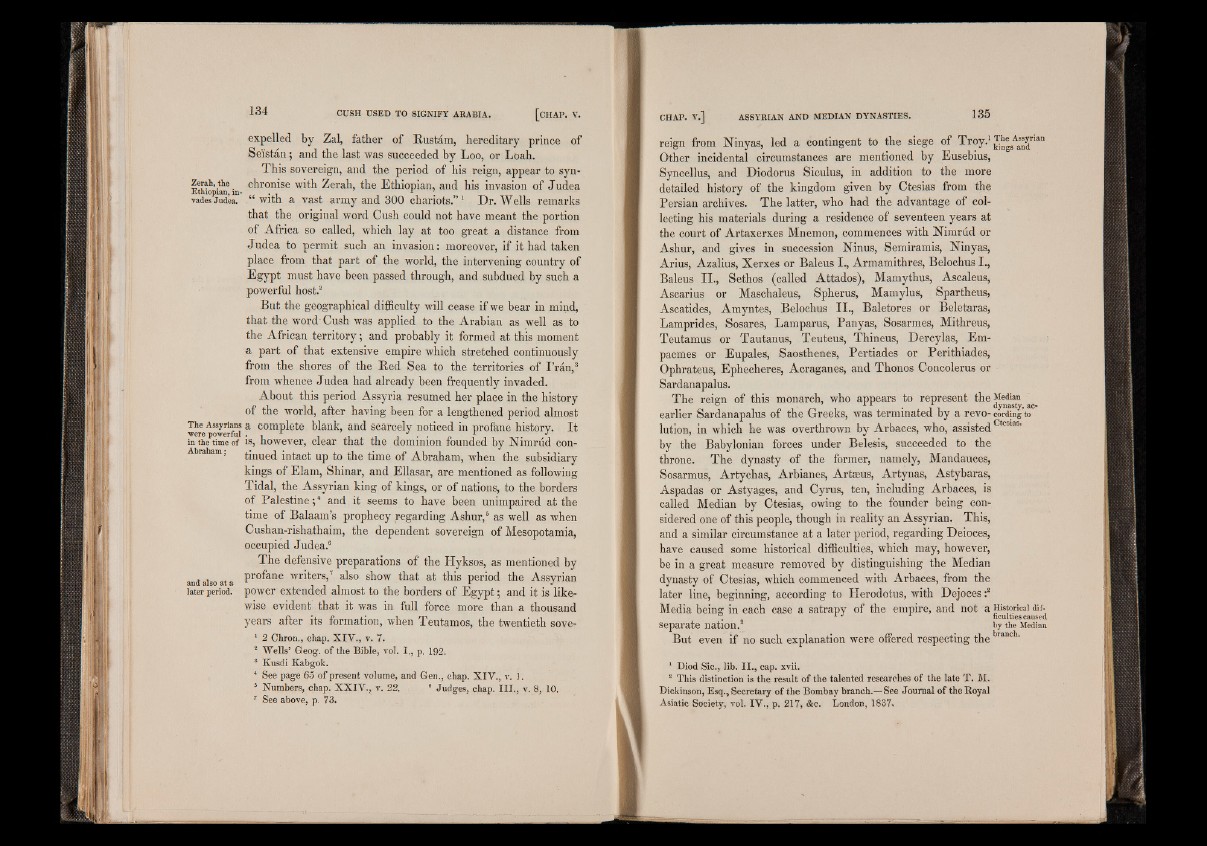
expelled by Zal, father of Rustam, hereditary prince of
Sei'stan; and the last was succeeded by Loo, or Loah.
This sovereign, and the period of his reign, appear to syn-
Zerah. the chronise with Zerah, the Ethiopian, and his invasion of Judea -hithiopian, m- . - A_ . (
yadesJudea. with a vast army and 300 chariots.’1 Dr. Wells remarks
that the original word Cush could not have meant the portion
of Africa so called, which lay at too great a distance from
Judea to permit such an invasion: moreover, if it had taken
place from that part of the world, the intervening country of
Egypt must have been passed through, and subdued by such a
powerful host.2
But the geographical difficulty will cease if we bear in mind,
that the word Cush was applied to the Arabian as well as to
the African territory; and probably it formed at this moment
a part of that extensive empire which stretched continuously
from the shores of the Red Sea to the territories of Tran,3
from whence Judea had already been frequently invaded.
About this period Assyria resumed her place in the history
of the world, after having been for a lengthened period almost
The Assyrians a complete blank, and scarcely noticed in profane history. It ■were powerful 1 1 . n r J
in the time of is, however, clear that the dominion founded by Nimr-ud com
Abraham, tinued intact up to the time of Abraham, when the subsidiary
kings of Elam, Shinar, and Ellasar, are mentioned as following
Tidal, the Assyrian king of kings, or of nations, to the borders
of Palestine;4 and it seems to have been unimpaired at the
time of Balaam’s prophecy regarding Ashur,5 as well as when
Cushan-rishathaim, the dependent sovereign of Mesopotamia,
occupied Judea.6
The defensive preparations of the Hyksos, as mentioned by
and also at a Pr°fane writers,7 also show that at this period the Assyrian
later period, power extended almost to the borders of Egypt; and it is liker
wise evident that it was in full force more than a thousand
years after its formation, when Teutamos, the twentieth sove-
1 2 Chron., chap. X IV ., v. 7.
8 Wells’ Geog. of the Bible, vol. I., p. 192.
8 Kusdi Kabgok.
4 See page 65 o f present volume, and Gen., chap. X IY ., v. 1.
5 Numbers, chap. X X IV ., v. 22. ’ Judges, chap. I I I ., v. 8, 10.
7 See above, p. 73.
reign from Ninyas, led a contingent to the siege of Troy.1 £ ^ Aa£^ nan
Other incidental circumstances are mentioned by Eusebius,
Syncellus, and Diodorus Siculus, in addition to the more
detailed history of the kingdom given by Ctesias from the
Persian archives. The latter, who had the advantage of collecting
his materials during a residence of seventeen years at
the court of Artaxerxes Mnemon, commences with Ninrrud or
Ashur, and gives in succession Ninus, Semiramis, Ninyas,
Arius, Azalius, Xerxes or Baleus I., Armamithres, Belochus I.,
Baleus II., Sethos (called Attados), Mamythus, Ascaleus,
Ascarius or Maschaleus, Spherus, Mamylus, Spartheus,
Ascatides, Amyntes, Belochus II., Baletores or Beletaras,
Lamprides, Sosares, Lamparus, Panyas, Sosarmes, Mithreus,
Teutamus or Tautanus, Teuteus, Thineus, Dercylas, Em-
pacmes or Eupales, Saosthenes, Pertiades or Perithiades,
Ophrateus, Ephecheres, Acraganes, and Thonos Concolerus or
Sardanapalus.
The reign of this monarch, who appears to represent the Median
m H H H B U R • i t. dynasty, ac- earlier Sardanapalus of the Greeks, was terminated by a revo- cording to
lution, in which he was overthrown by Arbaces, who, assistedCtesias-
by the Babylonian forces under Belesis, succeeded to the
throne. The dynasty of the former, namely, Mandauces,
Sosarmus, Artychas, Arbianes, Artaeus, Artynas, Astybaras,
Aspadas or Astyages, and Cyrus, ten, including Arbaces, is
called Median by Ctesias, owing to the founder being considered
one of this people, though in reality an Assyrian. This,
and a similar circumstance at a later period, regarding Deioces,
have caused some historical difficulties, which may, however,
be in a great measure removed by distinguishing the Median
dynasty of Ctesias, which commenced with Arbaces, from the
later line, beginning, according to Herodotus, with Dejoees :2
Media being in each case a satrapy of the empire, and not a Historical dif-
. 1 J 1 Acuities caused separate nation. by the Median
But even if no such explanation were offered respecting the nmch'
1 Diod Sic., lib. I I ., cap. xvii.
! This distinction is the result of the talented researches of the late T . M.
Dickinson, Esq., Secretary of the Bombay branch.—See Journal o f theBoyal
Asiatic Society, vol. IV., p. 217, &c. London, 1837.